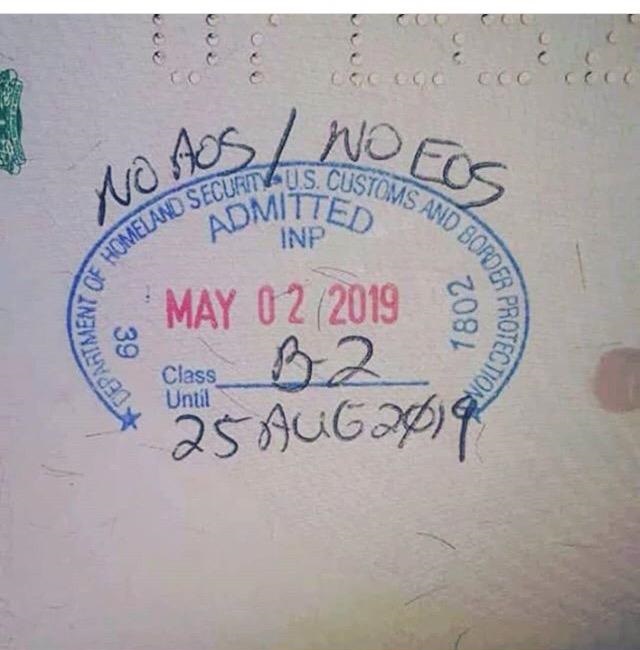POSTING DATE: June 10, 2019
Learn More About:
Immigration News & Updates eNewsletter © 2011 - 2019
For questions about U.S. Residency, Green Cards and Immigration Visas, Visit our Website at: www.ImmigrateToday.com or call our office at: (954) 382-5378
Check Out This Cool Stuff For Immigrants....
Immigration
Questions & Answers
This Week's Immigration News
Question: Hello there, Carolyn, a friend of mine sent me a photo of a passport stamp by immigration officials at the airport (which I guess is circulating on social media), which shows the notation “No AOS/EOS”, which allegedly means 'No Adjustment of Status/Extension of Status”. Are you aware of any such thing? In this climate of fear, there is so much information circulating, one does not know what to believe. Thanks for any information you can guidance, and continue providing the invaluable service you do. Best regards.
Answer: That is a great question. I will use it in my next column. What you are referring to is a notation made by the Customs and Border Patrol officer usually at a port of entry like an airport in an international visitor’s passport. That notation was not common in the past, but is getting more and more common under Trump policies. Generally, this is made by the officer as a means to intimidate the traveler, which it obviously does in most cases. But, the notation DOES NOT prevent an individual from filing an extension or change of status in the U.S..
What the notation does is essentially two things:
1) Operates like a deterrent to make the individual believe that they can't file to extend, change or adjust status AND
2) Tells the next border officer to look more closely at the individual the next time they try to enter the U.S. to see if they are returning to the U.S. too often, staying too long and potentially working illegally, etc.
Let me know if you have any questions about it.
Helpful Immigration Tips You Can Use...
Immigration News & Updates eNewsletter
eNewsletter
With great fanfare, the Democratic held House of Representatives passed the 2019 Dream Act last week, which would, among other things, provide permanent legal status and a pathway to citizenship for millions of young immigrants, called “Dreamers”. The American Dream and Promise Act of 2019, seeks to provide permanent protections to young immigrants brought to the U.S. as minors, known as Dreamers, and those holding Temporary Protected Status (TPS) and Deferred Enforced Departure (DED)status.
So what happens now? Is it a law yet? When can Dreamers and others who are eligible apply? Well, the unfortunate reality is that in our current political climate, nothing is going to happen and the 2019 Dream Act approved by the Democratic House, will likely die in the Republican held Senate.
2019 Dream Act Passed By Democratic House,
What Happens Next?
Immigration How To:
How Do I Answer This Letter I Just Got From Immigration?
New Requirements Just Added For Green Card Lottery
All Visa Applicants Now Required To Provide ID And Passwords
For All Social Media Used In Past Five Years!
In yet another effort to restrict legal immigration, the State Department issued a proposed regulation on June 5th, which now requires that all foreign national applicants applying for the yearly Diversity Visa program, also known as the Green Card Lottery, have valid unexpired passports to prove identity and citizenship at the time of applying. Until now, applicants were only required to provide passport information once they won the visa lottery and were undergoing the final immigration application process. Critics say this requirement is just another way of limiting eligibility for immigrants who might otherwise qualify.
For background, each year the State Department makes 55,000 immigrant visas available for Green Cards in a random lottery.
How To Successfully Answer A USCIS Request for Evidence (RFE)
A Request for Evidence (RFE) is a letter that the USCIS officer sends you to request additional information or documentation on your application. RFE requests are generally most frequently issued for missing information or documentation to establish your eligibility.
Properly responding to an RFE from the USCIS
The first tip is the most obvious, always read the RFE letter very carefully to determine exactly what kind of evidence or document is being requested.
For background, in the U.S. political system, each chamber of congress (House and Senate) creates and votes on its own legislation. However, in order to become law, the legislation has to then go to the other chamber to be passed, then finally signed by the President. This is why so many important issues in our society remain unresolved. Unless there is bipartisan support (meaning both the Democrats and Republicans) agree on an issue, no legislation can be passed by Congress and become law. And even if both the House and Senate agree on an issue, for instance like recently, both chambers voted to stop funding Saudi Arabia’s war in Yemen, once the Bill got to Trump, he Vetoed it (meaning he refused to sign it into law). The only way to get the law passed without the President is for each chamber of congress to get a two-thirds vote to override the veto, which is nearly impossible, since most Republicans fear Trump’s retribution.
As a result, the Dream Act will likely need to wait until 2021, when, hopefully, a Democrat holds both the Whitehouse and Senate, in order to get this and other legislation passed for immigrants and our country as a whole. Stay tuned…..
Read the 2019 Dream Act
For instance, visitors for business or tourism cannot work in the U.S. or have the intent to immigrate here. Therefore, if social media posts like facebook show the applicant discussing his or her U.S. fiancée or raving about a great job offer to work in the U.S., that could spell disaster for a visa application and result in a denial. Similarly, even a hint on social media that the applicant wants to study in the U.S. could be a death knell for a tourist visa as well.
And while Trump administration officials say the new social media policies were put in place to "protect US citizens", one could argue that any visa applicant who had been expressing sympathies on terrorist websites, would not be honest in listing the websites in his or her application.
Read the State Department Announcement
The noose is tightening as Trump officials come up with more and more policies and procedures as a way to keep foreign nationals “out” of the U.S.. In line with such policies, the U.S. Department of State (DOS) has recently added a question to both the online immigrant visa application (DS-260) and non-immigrant visa application (DS-160), requiring applicants to list all social media platforms they have used in the past five years, including login and passwords.
The DOS intends to use this information to review applicants’ social media postings in order to help determine the intent of their planned entry into the U.S..
It’s estimated that some 14 million people apply each year from around the world by submitting their entries online on the DV Lottery website, with the registration period generally open for application between October and November. The results become available early May the following year, allowing applicants to check the status of their application through the DV website (meaning there is no email, call or correspondence sent to winners).
Supreme Court Denies Trump’s Request To Expedite DACA Hearing
IIn September 2017, Trump issued an order to terminate the Deferred Action for Childhood Arrivals (DACA) program, and successfully closed the door on all future DACA applications. But during the past several years, numerous federal courts have ruled against the administration’s cancellation of the program and as a result, the USCIS continues to be required to accept DACA renewal applications.
Over the past years Trump officials have tried various strategies to win the battle against DACA, yet all have failed and the case is finally set to go before the Supreme Court next year. That, however, is not soon enough for this administration, so the Justice Department made a special request to "expedite" the matter so that the Supreme Court would agree to hear the case more quickly this summer.
In a surprise decision, to the joy of many young Dreamers, the Supreme Court issued another blow to the administration last week when the court handed down a decision denying Trumps request. As a result, the USCIS must continue to renew some 800,000 DACA applications every two years until the matter is finally decided or until Congress and the Executive branch agree on a DACA Bill which can actually become law.
Question: I have a question about my visa extension. I came to the us in may 2018 and decided to stay to visit my family longer, so I applied for a 6 mo extension in nov 2018 before my i-94 expired. I got a receipt and then nothing for the longest time, now if finally got the extension paper from the immigration, but the date on it says I am authorized to stay for the additional six months which expired in May 2019 and its already June 2019 so my time expired!! I cant believe it! Is that legal?
Answer: Unfortunately, that is very common these days. USCIS processing times for extensions of stay and change of status can take 6-8+ months. Usually by the time the decision is made, one of two things has occurred, 1) if it’s a denial, the individual’s I-94 has expired or 2) if the extension is approved, only six months from the date of the request is given, so again, the individual’s I-94 has expired by the time they receive the extension approval. As a result, in both cases, the individual’s U.S. visa is automatically cancelled. This policy seems to have the effect of penalizing any foreign national who visits the U.S. and applies to extend their time here, since in many cases, the mere act of filing such an extension causes the visitor to lose their U.S. B1/B2 visa, sometimes for many, many years.
Question: I applied for my elderly mom for a green card and she just received it last week. She has heart problems, so we want to get her health insurance. My question is whether I can get her medical insurance on the obamacare (health market place) or is that a violation of the rules now?
Answer: Now that your mother is a U.S. Resident (Green card holder), she is eligible to obtain health insurance under Obamacare (the Affordable Care Act). Currently, there is no restrictions on eligibility for Residents and obtaining insurance under Obamacare will have no negative implications for your mother. However, she is not eligible for Medicaid until she has been a resident for at least five years, so you will need to make sure that she pays a health insurance premium (no matter how small) for her insurance coverage.
Be Prepared For Your Residency Interview – Tips On Documents You Will Need For Approval
The immigration process to adjust status to residency in the U.S. can be long and tedious, sometimes taking nearly two years to finally receive your residency interview. So with all that waiting, it’s important to be sure that you bring the right documents with you to your interview, to ensure approval. Otherwise, the USCIS will issue you a request for missing documents, which can unnecessarily delay approval of your green card for up to three months or more after your interview! But understandably, determining which documents to bring with you can be difficult, since the interview notice itself is very confusing, providing a list of documents for all different kinds of cases, not specific to each individual immigrant.
So to avoid confusion and delays caused by failing to provide required documents, let’s go over a few important items which every immigrant must bring to his or her residency interview:
- Interview notice
- new Medical Report if previous one submitted has expired (most old medicals have expired, since they were only valid for one year prior to November 1, 2018)
- current Passport & all prior Passports
- I-94 card (if you entered the U.S. PRIOR TO 2013 otherwise “online I-94 printout”)
- Work Authorization card/Travel Permit
- Driver’s License
- ORIGINAL Birth Certificate
- ORIGINAL Marriage Certificate for current marriage (not for past marriages)
- ORIGINAL/CERTIFIED Divorce Decree for every marriage in the past
- ORIGINAL/CERTIFIED Criminal Documents for any criminal case of any kind, including traffic cases which required a court appearance. Criminal Documents must include: a) CERTIFIED Police Report or Traffic Ticket and b) CERTIFIED Court Disposition (you must bring both a & b to give to the officer at your interview)
Every U.S. Citizen or U.S. Resident sponsor should bring:
- ORIGINAL Birth Certificate (if sponsoring a sibling) AND
- Proof of U.S. Citizenship or U.S. Residency (i.e. ORIGINAL Naturalization Certificate , US passport or Green Card
- Driver’s License
-For marriage residency: U.S. Citizen or U.S. Resident Spouse’s Original/certified Divorce Decree for every marriage in the past, in addition to extensive marital documentation (see below)
-While not required, it’s also helpful for the U.S. Citizen or U.S. Resident to bring an updated tax return and W-2 for the current year since filing the residency case, a currently dated employer letter and current paystubs
Marriage residency cases are particularly complicated, since in addition to the above, the USCIS officer will expect the married couple to provide extensive documentation of their lives and financial affairs together, including:
- Photos of the Couple: Original Photos of pictures you have together, during the time you were dating, pictures of your wedding and all pictures you have taken since you married. Assemble photos in Photo Albums. As many as you can, the more the better. Residency interviews can go quite quickly for couples who have lots of photos. Digital Photos will not qualify. The officer will not look at digital photos on your cell phone or camera. Include at least 8 Original Photos of you as a couple together (Wedding, Holidays, etc) for the officer to keep in the USCIS file
-Tax Returns FOR ALL YEARS since you got married, showing “married filing jointly” AND W-2’S for Both spouses;
-Joint Bank accounts statements showing both spouse names since before and after you got married until present -stmts only, not checks
-Joint Credit Card Statements/Investment Accounts showing both spouse names showing both spouse names since before and after you got married until present (if available)
-Joint Auto Insurance policies & Insurance Cards showing both spouse names since before and after you got married until present
-Joint Health Insurance card/policy & Insurance Cards since you have been married (if available)
-Joint Warranty Deed, Joint Closing Documents, Joint Homeowner’s Insurance policy;
-Joint Lease Agreement showing both spouse names since before and after you got married until present
-Joint Utility Bills in Joint Names showing both spouse names since before and after you got married until present
-Separate Utility Bills in U.S. Citizen’s/Foreign spouse’s name showing marital address to prove you reside together even though the bill is not in both spouses names
-Joint Auto purchase contract/Automobile Registration showing both spouse names
-Joint Travel tickets/itineraries and boarding passes for trips showing both spouse names since before and after you got married until present
-Joint Receipts for items purchased together, for example, furniture showing both spouse names since before and after you got married until present
-Joint Birth Certificate for child born to the couple (if applicable)
-Joint Gym Memberships showing both spouse names since before and after you got married until present
-Joint Church & Club Memberships showing both spouse names since before and after you got married until present
-Joint BJ’s, Costco & other similar Cards showing both spouse names since before and after you got married until present
-Other documentation to show parties have been living together as married spouses showing both spouse names since before and after you got married until present.
-Copy of Driver’s License for both spouses showing the same marital address.
In most residency interview cases, once you have been called and are in the interview room, the officer will have the immigrant and sponsor take an “oath” to tell the truth, have them show their identification (driver’s license, passport) and then take the immigrants fingerprints and digital photo. Following that, the officer will generally want to see the original “civil” documents such as birth and marriage certificates, divorce decrees, naturalization certificate, etc. The officer will generally then review the family petition (I-130) and residency application (I-485) by asking the sponsor and immigrant to verify information on the form such as address, social security number, parents names, children’s and spouses names, etc. For marriage interviews, the officer will ask the couple questions about their relationship, marriage and life together as well.
All immigrants will also be asked a myriad of “admissibility” and criminal questions (expect between 20 and 40) and then ask the immigrant to sign the I-485 residency form. After that, the interview is generally complete. Its always a good idea to confirm with the officer whether there is any other documents or information they need (in case they forgot to ask) so you can give it to them right there during the interview. In cases which go smoothly, the officer will approve the case and order the green card the same day, which the immigrant receives in the mail in about 2 weeks. In others, where required documentation is missing or the marriage interview did not go well, the officer will send the immigrant a letter requesting additional documentation. Once that is provided to the office however, it can take three months or more for the case to be approved.
You can get sample questions for marriage interview cases, just give us a call and we will email to you.
Our Firm provides interview preparation and representation as well, ensuring that you have all the documents required and understand exactly what will happen in your particular case. Give us a call at: 954-382-5378.
Some RFE's are more complex than the others and it is difficult to determine and some are simple and easy to understand. For more complicated RFE letters, you may want to retain an immigration attorney to assist you. Once you have determined what the letter is requesting, be sure to provide the exact document requested. For instance, an officer may request a “long form” of a Birth Certificate. If you respond that you do not have one, your case will likely be denied. The appropriate action to take is to request one from the departmental authority in your country of birth.
Timing, don’t wait too long to respond to an RFE
Depending on the type of case, you may have from 33 days to 87 days to respond so that the USCIS receives your response before the expiration date. If you fail to respond or filed after the deadline, your case will likely be denied. To be on the safe side, you should always send your response by Express or Priority Mail and get a delivery confirmation. Never send any communications to the USCIS via Certified Mail, which takes much longer and can risk your response being received late. Finally, remember that your response to the USCIS officers request must be RECEIVED by the USCIS ON or BEFORE the deadline. Responses received even one day late result in complete case denials.
Obtaining a decision from the USCIS after responding to the RFE
Depending upon the case, it could take up to 60 days or more. You can check the online status to see if it is stating that your RFE response has been received, or call the USCIS 800# to ask if the computer shows the USCIS received it. For adjustment case (I-485) requests, the officer may wait to receive your response before continuing processing of your Work Authorization application which will cause delays in its issuance. To avoid this, send your response as soon as possible and do not wait until you get near the deadline in the letter.
Questions?
If you need legal assistance responding to an USCIS request, contact a qualified Immigration attorney or call our office at: (954) 382-5378.














